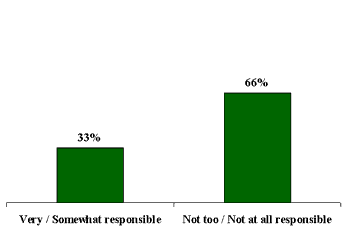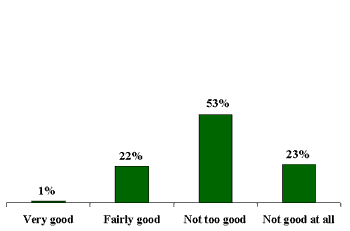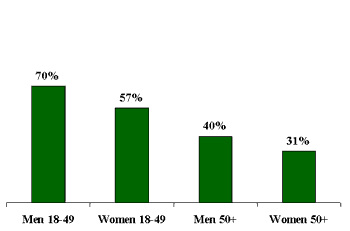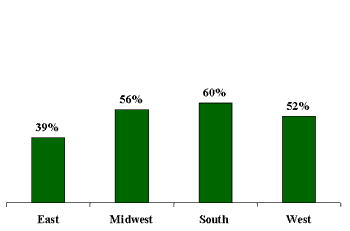GALLUP NEWS SERVICE
PRINCETON, NJ -- Echoing the legal arguments made by smokers against the tobacco industry, some obese Americans are now trying to blame fast-food chains and other food suppliers for their health problems. The Senate's No. 2 Republican, Mitch McConnell of Kentucky, filed a bill last Thursday -- backed by the restaurant industry, but opposed by the Association of Trial Lawyers of America -- that would shield the food industry from such lawsuits.
A new Gallup Poll, conducted July 7-9, indicates that Americans are solidly aligned with McConnell on this issue. Only a third of Americans believe the fast-food industry bears much responsibility for the health problems faced by obese Americans. Just 6% say the industry is very responsible and 27% say it is somewhat responsible. The remainder believes the industry is generally not responsible, including 25% saying "not too responsible" and 41% saying "not responsible at all."
| How responsible is the fast food industry for the health problems faced by obese people in this country -- very responsible, somewhat responsible, not too responsible, or not responsible at all? |
 |
| July 7-9, 2003 |
Even more to the point, nearly 9 in 10 Americans (89%) oppose holding the fast-food industry legally responsible for the diet-related health problems of people who eat that kind of food on a regular basis. Just 9% are in favor. Those who describe themselves as overweight are no more likely than others to blame the fast-food industry for obesity-related health problems, or to favor lawsuits against the industry.
Would you favor or oppose holding the fast food industry legally responsible for the diet-related health problems of people who eat fast food on a regular basis?
|
Favor |
Oppose |
|
|
2003 Jul 7-9 |
% |
% |
|
National adults |
9 |
89 |
|
Overweight |
10 |
89 |
|
Weight about right |
7 |
90 |
|
Underweight |
10 |
88 |
Consumer Awareness
The public's belief that consumers, rather than fast-food companies, should be held responsible for what people eat presumes that average Americans understand the health risks associated with fast food. Whether the public appreciates the full extent of these supposed health risks isn't clear, but according to the new poll, most U.S. adults appear to be generally aware that most fast food is not good for them: three-quarters of Americans believe this, while about one-quarter (23%) believe it is good for them.
| Overall, do you think that most of the food served in fast food restaurants is very good for you, fairly good for you, not too good for you, or not good at all for you? |
 |
| July 7-9, 2003 |
These attitudes are fairly uniform across different gender, age, and other demographic groups. However, there is a slight difference by education, with less-well-educated Americans being about twice as likely as those with college degrees to perceive fast food as "good for you": 26% vs. 14%. Similar differences are seen by income, with upper-income Americans being the most critical of the health value of fast food. There is also a difference according to the frequency with which one eats fast food. About a quarter (27%) of those who eat fast food at least once a week -- vs. only 15% of those who never eat it -- believe most of the food served is "good for you."
A "Fast-Food Nation" Indeed
Despite Americans' widespread knowledge that most fast food is something less than good for them, the poll finds that nearly all Americans indulge in it at least once in a while. Only 5% say they never eat at fast-food restaurants. About 4 in 10 Americans report moderate to light consumption of fast food, saying they eat it only a few times a year (13%) or only once or twice a month (30%). Another third (31%) go to fast-food places about weekly, while 21% go at least several times a week.
How often, if ever, do you eat at fast food restaurants, including drive-thru, take-out, and sitting down in the restaurant -- every day, several times a week, about once a week, once or twice a month, a few times a year, or never?
|
|
Several times |
About once a week |
Once or twice a month |
A few times |
|
|
|
2003 Jul 7-9 |
4% |
17 |
31 |
30 |
13 |
5 |
Men are more likely than women to eat fast food on a frequent basis, and younger adults are much more likely to do so than are older Americans. Overall, more than half of all men eat fast food at least weekly (59%), compared with 46% of women. The percentage dining on fast food at least weekly ranges from 65% among 18- to 29-year-olds to only 27% among those 65 and older.
The net result is that the most frequent fast-food diners are younger men, and the least frequent are older women. Seven in 10 men aged 18-49 report eating at fast-food restaurants every day, several times a week, or about once a week. This contrasts with 57% of women in the same age category. The rate drops further to 40% among men 50 and older and to just 31% among women 50 and older.
| Eat Fast Food at Least Weekly By Age/Gender |
 |
| July 7-9, 2003 |
Perhaps because of this younger age skew in fast-food dining, the Gallup Poll shows no connection between frequency of eating fast food and respondents' self-reported health. Eighty-two percent of those eating fast food at least weekly, and 80% of those who rarely or never eat it, say their health is either excellent or good.
|
Self-Reported Health by Frequency of Eating Fast Food
|
|||
|
At least weekly |
Once or twice a month |
Rarely/Never |
|
|
Health: |
|||
|
Excellent |
30% |
31% |
33% |
|
Good |
52 |
43 |
47 |
|
Only fair |
14 |
20 |
15 |
|
Poor |
4 |
6 |
5 |
|
100% |
100% |
100% |
|
Fast-food consumption is fairly even across the United States, with one exception: adults in the East are less frequent fast-food diners than are those in the rest of the country.
| Eat Fast Food at Least Weekly By Region |
 |
| July 7-9, 2003 |
This regional difference could be due to different eating preferences or habits on the part of Easterners, or it could simply reflect the type and number of fast-food establishments available in each region. The poll does offer one piece of evidence that eating habits may not be the cause: Respondents in the East are only slightly more likely than those from the other three regions to describe their eating habits as "healthy."
|
Overall, how healthy would you say your diet
is --
|
||||
|
East |
Midwest |
South |
West |
|
|
% |
% |
% |
% |
|
|
Very healthy |
25 |
18 |
26 |
22 |
|
Somewhat healthy |
66 |
67 |
60 |
61 |
|
Total "healthy" |
91% |
85% |
86% |
83% |
Lipstick on a Pig?
Critics of fast-food companies have charged that the industry should be doing more to offer healthier food, and to make the nutritional content information of its food more prominent. But these types of changes may not be as effective as some might hope.
Gallup asked regular eaters of fast food -- those who dine on fast foods at least monthly -- whether they would choose new healthier menu options if they became available. Only a bare majority, 56%, say they would, while 41% say they would stick with their current favorite items. (Of course, for some customers, their current favorites could already be healthy food items, such as salad or grilled chicken.)
And as for reading food labels, it is not clear that the public would grasp the significance of calorie, sodium, and fat levels, even if these were printed directly on fast-food packaging. Only a quarter of the public reports paying a lot of attention to food warnings and nutritional recommendations. Another 33% report paying a "fair amount" while 44% pay only "some" attention, or less.
How much attention do you pay to the food warnings and nutritional recommendations you hear or read about? Do you pay -- a lot of attention, a fair amount, some, not too much, or none at all?
|
|
Fair amount |
|
Not too much |
None |
|
|
2003 Jul 7-9 |
23% |
33 |
23 |
12 |
9 |
Perhaps the strongest indication that Americans will eat what they want, regardless of the nutritional facts, is the data presented in the following table. While the frequency of eating fast food is higher among those who consider it "good for you" than among those who consider it not good, half of those who consider it "not good" still eat at fast-food restaurants at least weekly. Only 20% of this group says it eats fast food a few times a year or never.
|
Frequency of Fast-Food Dining According to Nutritional Rating of Fast Food
|
||
|
Very good/ |
Not too good/ |
|
|
Weekly or more |
62% |
50% |
|
Once or twice a month |
27 |
30 |
|
Rarely/Never |
11 |
20 |
|
100% |
100% |
|
Survey Methods
These results are based on telephone interviews with a randomly selected national sample of 1,006 adults, 18 years and older, conducted July 7-9, 2003. For results based on this sample, one can say with 95 percent confidence that the maximum error attributable to sampling and other random effects is ±3 percentage points. In addition to sampling error, question wording and practical difficulties in conducting surveys can introduce error or bias into the findings of public opinion polls.
37. Overall, how healthy would you say your diet is -- very healthy, somewhat healthy, not too healthy, or not at all healthy?
|
Very |
Somewhat healthy |
Not too healthy |
Not at all healthy |
No |
|
|
2003 Jul 7-9 |
23% |
64 |
12 |
1 |
* |
|
2001 Jul 19-22 |
25% |
59 |
14 |
2 |
* |
|
* Less than 0.5% |
|||||
38. How much attention do you pay to the food warnings and nutritional recommendations you hear or read about? Do you pay -- a lot of attention, a fair amount, some, not too much, or none at all?
|
|
Fair amount |
|
Not too much |
None |
No opinion |
|
|
% |
% |
% |
% |
% |
% |
|
|
2003 Jul 7-9 |
23 |
33 |
23 |
12 |
9 |
* |
|
2002 Jul 9-11 |
22 |
33 |
21 |
16 |
8 |
* |
|
1989 Sep 12-15 |
26 |
36 |
16 |
13 |
9 |
* |
|
* Less than 0.5% |
||||||
42. How often, if ever, do you eat at fast food restaurants, including drive-thru, take-out, and sitting down in the restaurant -- every day, several times a week, about once a week, once or twice a month, a few times a year, or never?
|
|
Several times |
About once a week |
Once or twice a month |
A few times |
|
|
|
|
2003 Jul 7-9 |
4% |
17 |
31 |
30 |
13 |
5 |
* |
|
* Less than 0.5% |
|||||||
43. Overall, do you think that most of the food served in fast food restaurants is very good for you, fairly good for you, not too good for you, or not good at all for you?
|
Very |
Fairly good |
Not too good |
Not good at all |
BAD |
No |
|
|
2003 Jul 7-9 |
1% |
22 |
53 |
23 |
* |
1 |
|
(vol.) Volunteered response |
||||||
|
* Less than 0.5% |
||||||
44. If fast food restaurants offered new healthier menu options, would you be very likely to choose these, or would you probably stick with your current favorite items?
BASED ON -- 804 -- ADULTS WHO EAT AT FAST FOOD RESTAURANTS AT LEAST MONTHLY
|
|
|
ALREADY CHOOSE HEALTHIEST ITEMS (vol.) |
|
|
|
2003 Jul 7-9 |
56% |
41 |
2 |
1 |
|
(vol.) Volunteered response |
||||
45. If fast food restaurants offered new healthier menu options, would you be more likely to eat at these types of restaurants, or not?
BASED ON -- 201 -- ADULTS WHO EAT AT FAST FOOD RESTAURANTS LESS THAN MONTHLY
|
Yes, more likely |
No, not |
No opinion |
|
|
2003 Jul 7-9 |
41% |
57 |
2 |
46. How responsible is the fast food industry for the health problems faced by obese people in this country -- [ROTATED: very responsible, somewhat responsible, not too responsible, (or) not responsible at all]?
|
|
|
|
Not |
|
|
|
2003 Jul 7-9 |
6% |
27 |
25 |
41 |
1 |
47. Would you favor or oppose holding the fast food industry legally responsible for the diet-related health problems of people who eat fast food on a regular basis?
|
Favor |
Oppose |
No opinion |
|
|
2003 Jul 7-9 |
9% |
89 |
2 |
